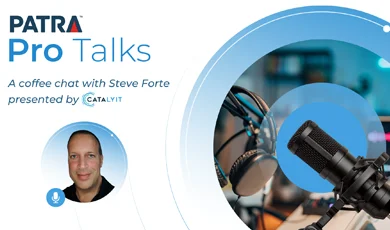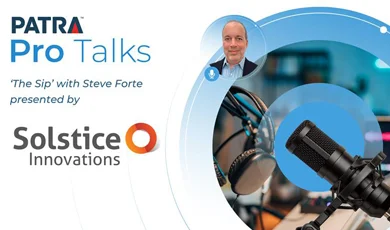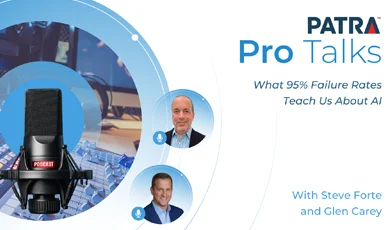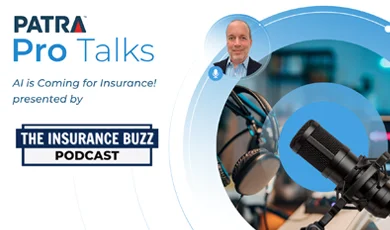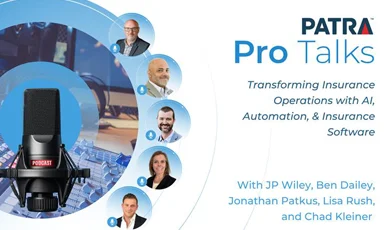Welcome, everyone, to Patra ProTalk. I’m Steve Forte, the IT insurance geek, and I also manage product marketing here at Patra. With me today is Glen Carey, industry veteran who manages new business development, for retail agencies and brokers. Welcome, Glenn.
Thanks for having me, Steve. This is exciting.
Alright. So let’s get into it. Probably less than two weeks ago, there was this headline that is clickbait everywhere on social media and websites.
Ninety five percent of Gen AI [generative ai for insurance] projects fail.
MIT study in Nanda, they did a study that, comprised of I think it was about a little over three hundred publicly traded companies, started from January until July of this year. They interviewed somewhere around fifty two or fifty three respondents from these different companies in different segments, financial services being one of the industries.
So what do you think? That’s it. Just pack everything up. Don’t even bother exploring it. Yeah.
I think it’s all sad, and it’s over.
I mean, I think that’s clearly the takeaway that we should bank on going forward. I mean, it’s an interesting study. I think it’s one that starts the conversation. I think it’s one that’s cautionary from the perspective of, you know, let’s be careful about how we’re spending our money and let’s get real clear around what our expectations are.
But I’m not sure this is a report that gets any traction without the name MIT attached to it. But I don’t think this was the faculty of MIT having done a three year study on success metrics and everything. So I think it’s like all good conversation points around the LinkedIn water cooler. You can take from it mostly what you want.
And, it’s a good example of we still need to be adults in the room, and this is not a one size fits all, solves all problems going forward. And you can waste a ton of money if you don’t have clarity on what your expected outcomes are. I mean, that’s really my takeaway on the whole thing.
I don’t know if you have a different think about it.
These are projects. They’re pilot projects. Okay? So they failed. Big deal. If you’re investing hundreds of millions of dollars in a pilot project and you’re not scoping it properly with the business requirements and the business case development and having clear KPIs and what you expect to obtain from this, then, okay.
Yeah. Then you’re gonna fail at it. But take a pilot. Right? You gotta look at where do you wanna start this off.
If you’re an insurance like we are, probably makes sense to start in the back office area first and see what you can do, whether it’s in the claims area or maybe underwriting or potentially compliance.
You know? So I don’t know. I just it’s like I said, it’s instant instantly clickbait material for people to be like, oh, well, that’s it. We’re not gonna do this. But, you know, if you look at technology and advancements that have gone on for eons now, people wouldn’t if they had that kind of mentality, they wouldn’t do anything. I mean, you know, before there was the Internet, we still did business. We still did things.
And the Internet came around on Yes.
Exactly. I think this is a transformative technology. I have no doubt.
I mean, for those of us old enough to remember when the Internet was you were hearing early stage radio ads where they would spell out, go to w w w dot blank dash, and they would even give you the backslash and all that to try and get people to understand how to use a URL.
There’s a shaking out process. This is not a flip of a switch and a guaranteed success. AI enabled you know, you could pretty much replace a lot of that with Internet enabled. I mean, necessary, powerful.
We’ll see. And and I think you mentioned the back office. I think that’s something that was highlighted in the report, which was that was where the greater level of success was found. Because as the old saying goes, if it’s rules based and repetitive, automate it. Humans stink at rules based for tentative activities. We get bored. We get frustrated.
We’ve got things to do and mistakes get made. So if it’s purely a process where you have a defined outcome, one of three things, if this, do that.
Yeah, AI is a great opportunity to really squeeze out some of that soul crushing work that is necessary in an industry with disproportionate amount of soul crushing work. You know, whether that’s checking certs or issuing certs or whatever that particular thing is. As I like to say to some of my clients, nobody ever poured themselves a glass of red wine on a Saturday night and said, I’m gonna do a policy check. Like, no. No. No one’s done it. Not yet.
Yeah. And think about it. There’s a good example right there. Policy checking needs to be done.
It’s absolutely necessary, but it’s laborious. I mean, think about it. If you’re going through a three hundred page policy and checking it, you wanna sit there and do that five thousand times or how many times how many policies you have in your agency? No.
So if there’s a tool out there, an AI tool that you can use to help speed that process up and then look at the results and obviously use your judgment as the insurance expert, Why not? I think people look at, especially that title, and they say, well, it’s just you know, it’s it’s almost like the gold rush. People are, oh, it’s AI, so we’ve gotta go rush and see what’s going on. Okay.
That’s great. And you know what, though? If you look at it think about it. In our personal lives today, people are using AI all the time.
People use AI to create emails, whether they’re in business or in their personal lives. So they’re they’re doing these things now anyway.
So, I mean, the fact that people are trying, they’re gonna fail at it. But nobody’s successful when they first do almost anything. So there has to be a starting point where people say, hey. You know what?
We’re doing a pilot program.
We have x amount invested into it. This is the parameters. This is what we expect. And, you know, if it fails, great. Learn from it.
You used the word dabbling. I think that’s a critical thing. I mean, you can do a fifty thousand dollar pilot that failed or a small engagement that, air quote, fails, and you have not disrupted your business. You have not put your people on the brink of extinction. You tried something to see if it worked and it didn’t or it didn’t in this situation.
But that’s what an iterative process is. That’s what this shaking out process is. You know, pre COVID, you know, the the the amount of work from home was pretty low.
Post COVID, that process proved it to a lot of people. That shaking out process, new conclusions are drawn. AI is gonna be the exact same way. I’m pretty sure that nobody has a perfect plan right now because in five years, this will have changed and morphed and evolved. And success stories will be told on stuff that wasn’t expected, and failures will be told on stuff that was. Stuff that we’re like, of course, this is gonna work. The fun is we don’t know which is which yet.
Yeah. I mean, that’s a good point. And you brought up something else too about, do people have to have AI adopted in their agency in order to to attract young talent, for example? If I’m doing manual policy checking with Manila folders and reading through policies, is that gonna attract the next generation of insurance people coming in? I doubt it. But if we’ve got some cool tech to do your job and you can work remotely, you know, that’s probably gonna help.
I would imagine back on the idea of cool tech.
I think this a lot of this is gonna be seen as table stakes.
I mean, you know Yes.
Here in my home state of New Jersey, I mean, there are there are government agencies that are still on a s four hundred systems. Now for those of you, there’s not many of you, but maybe if you’re listening to an insurance podcast, you are old enough. AS four hundred is the IBM system that came out in the early eighties. And we have huge state agencies where all the people who know how the thing works are either long retired or passing away and it’s a problem. And you get a twenty six year old genius and try and teach him what the f eight key is. That’s a problem.
You really have to evolve. So this can’t be just going back to your agency, we’ve got some cool tech.
Twenty three, twenty four year olds are like, I can’t believe you consider this cool. Like, I can’t believe you didn’t solve this problem five, ten, fifteen years ago. That’s the challenge that we’ve got, and we’ve been talking about this wave of retirements for, I don’t know, twenty years now, fifteen years. Yeah. You want people to start doing more with less. You can’t just be once more into the breach, dear friends, and, you know, we’re gonna go get them and work a seventy five hour week and expect that person to stick around. Like, do it for a week or two, but they ain’t gonna make a career out of that.
Exactly. What do you think about this? What about the notion of where people have trepidation in AI because, oh, it’s gonna replace my job. My job’s gonna be obsolete. I’m gonna be out of work because AI is gonna replace what I’m doing today.
For some people, that’s a real fear, and I think it’s a bit unfounded at the moment. I mean, there’s certainly will AI be doing brain surgery? No. But will computer assist brain surgery happen? You bet.
It’s being done today.
Yeah.
I mean, I see For you and I in the insurance industry, do you believe that AI only can sell a complex insurance policy to a business?
No. And I don’t believe that again, I’ll go back to the phrase of a shaking out period. I I think people can become valuable within an organization doing incredibly mundane things. And if you’re good at that, my then question is do you like that?
And those are two different things because you can make a nice little bundle being good at something that maybe you don’t fundamentally like. I don’t know that anybody likes extracting data out of policies. They may get a kick out of comparing coverages because that’s the creative work. But will jobs change?
Sure. Something like a hundred years ago. So nineteen twenty five. So a hundred and ten years ago, nineteen fifteen.
Something like eighty percent of the American economy was connected in one way or another to farming.
Like, you were either a farmer, you were a distributor, you were a trucker that moves stuff around, you were a retail, but you were connected to farming. Now it’s something like one and a half percent. I don’t see everybody nowadays walking around going, I wish I could just get back on the farm and pick things by hand the way my great great grandfather used to. Yeah.
I mean, it it’s just it’s a it’s a paradigm shift. I think it’s largely positive because I think AI is going to replace at the very least, and we’re talking I ten, fifteen years. It’s gonna be a long time before it truly starts replacing people. And even then, what job were you doing?
Everybody has or a lot of folks have a Gen AI [generative ai for insurance] or a ChatGPT app on their phone. And I did it the other day for a vacation that my wife and I are thinking about. And I was like, what are some of the best things to do in Charleston, South Carolina with kids under ten?
And it came up with this great list.
I love that list. That’s really valuable.
I also didn’t pay much for it.
Right? So would I have paid fifty bucks for that list? No. If it was free and it’s in my phone or largely free and it’s in my phone, okay.
So I think there’s gonna be this supply and demand curve of can it do these things? Yes. Am I willing to pay for them? Depends.
If it came up with stuff that I’m currently paying you know, maybe if I had a travel agent on retainer and I would call Gert and say, hey, Gert. Can you come up with a list of fun things to do in Charleston, South Carolina with an eight year old? And I used to pay her that. Maybe Gert would be at risk at this point. But that’s another one. Travel agencies used to be a real they were on every main street.
They’re not.
I know that was painful for people who built up their travel agency, but they adapted in a lot of cases. It’s not that there are no travel agents, but I think there are no average travel agents.
Not like there used to be. No doubt about it. Mhmm. Well, this was this was an interesting take on the article.
I was thinking the same thing. Like, this shouldn’t scare people. This is something that, yes, things are gonna fail, and you just learn from it, and you pick up and keep trying, keep doing. What would you say in your expert opinion, what’s a good bottom line for people to walk away from from listening to this podcast?
What should what should they think about going into the office tomorrow?
I think the meaningful thing is this is a process. The fun of being an insurance is the concept that risk management is in our DNA. We’re taking an iterative, cautious, conservative approach to these sorts of things. No one is getting wiped out tomorrow because of this, and no one is ruling the world tomorrow because of AI.
This is a this is a process, and this is one more drop in the bucket. And we’re gonna see how this plays out, and it’s gonna be it’s gonna be fun. It’s gonna be interesting because nobody really knows exactly. And are there concerns?
Sure.
But there’s also a lot of opportunities, and those are always taken in balance.
Well said. Awesome. Thank you, Glenn.
I really appreciate your time and your insights today.
Thanks so much.
And thank you, everyone. Stay tuned for the next Patra ProTalk coming soon.
